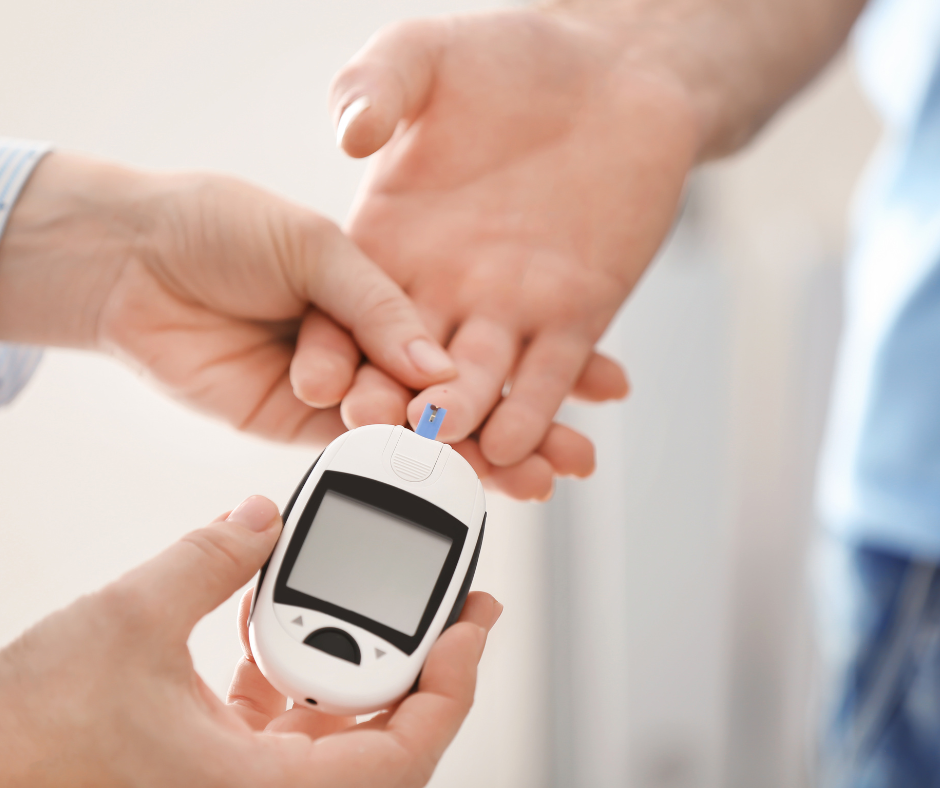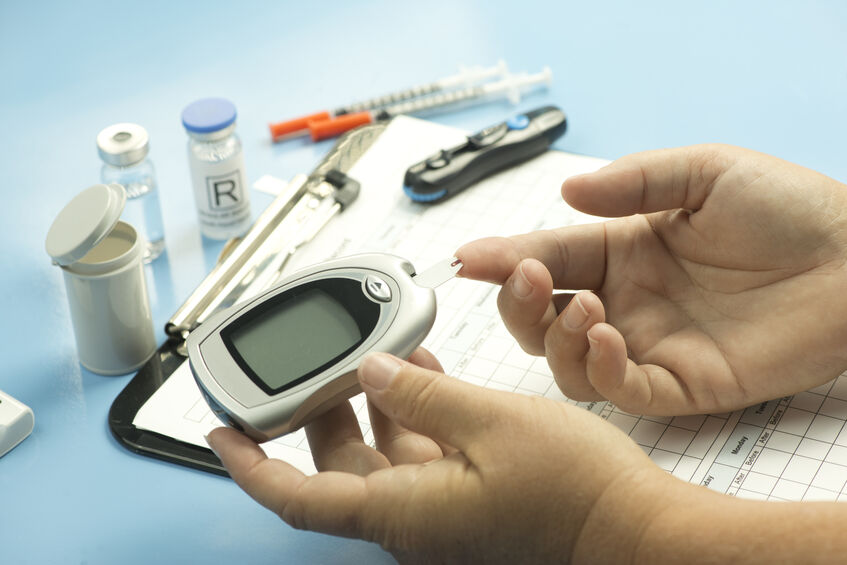-
5 Ways Diabetes Impacts Your Feet

So, you have diabetes, but you’ve never really considered the impact it can have on your feet. We at Kentlands Foot and Ankle Center love treating people with diabetes and educating them on the importance of proper foot hygiene and management. Today, we’ll be talking about the 5 main foot issues that chronically high blood sugar could lead to.
Peripheral Neuropathy
One of the most significant dangers is peripheral neuropathy, which is nerve damage caused by consistently high blood sugar levels over time. Tingling, burning pain, numbness- you might not feel a small cut from stepping on something, a blister from old shoes, or even the constant pressure of a poorly placed seam in a sock. Without the warning signal of pain, these minor injuries can worsen right under your nose.
Peripheral Artery Disease
Diabetes also frequently contributes to Peripheral Artery Disease, which is where the arteries in the legs and feet narrow due to plaque buildup. High cholesterol can reduce blood flow to the lower extremities.
And when circulation is compromised, your feet feel cold, your legs ache and cramp when walking, and most dangerously, the body’s ability to heal is impaired. Even a small wound or infection on the foot can struggle to receive the oxygen and nutrients needed for healing, which raises the risk of it becoming chronic and non-healing.
Foot Deformities
This combination of nerve damage and reduced circulation can also lead to structural changes in the feet. When the muscles weaken, it leads to imbalances and gait issues that result in foot deformities like bunions, hammertoes, or even the devastating collapse seen in Charcot foot.
These deformities then create abnormal pressure points on the foot, and coupled with impaired sensation, they can continuously rub against your shoes without you even feeling it. Yet another risk for blisters and cuts.
Infections
High blood sugar levels can also weaken your immune system, which can make a diabetic more vulnerable to getting sick. This weakened defense, coupled with reduced blood flow and neuropathy, creates a perfect storm.
What might be a simple cut for someone else can quickly escalate into a severe fungal infection for a diabetic.
Diabetic Foot Ulcers
All these factors can culminate in the development of a diabetic foot ulcer – an open sore that penetrates through the skin. These ulcers are the most serious threat, as they can become infected, lead to deep-seated bone infections, and tragically, are the leading cause of lower limb amputations in people with diabetes.
Manage Your Diabetes
The dangers of diabetes for foot health are significant. Proactive daily foot checks, choosing appropriate footwear, and regular visits to a podiatrist are not just recommendations; they are vital steps in preventing these life-altering complications and preserving mobility.
Interested in learning more? Schedule a comprehensive foot examination with Kentlands Foot and Ankle Center podiatrist Dr. Jon M. Sherman. To make your appointment, please call our office at 301-825-9697.
-
National Diabetes Awareness Month: Do’s and Don’ts

November is National Diabetes Month, so the time is right to emphasize how diabetes impacts both your overall health and your feet in particular.
Kentlands Foot & Ankle Center knows how overwhelming it can be to manage this chronic condition alone, so with that in mind, we’ve gathered some helpful hints and tips to make at-home management far easier. Keep reading to learn the “Do’s and Don’ts” of diabetic foot care, courtesy of our expert team!
DO: Practice Good Nutrition
What you eat directly affects your diabetes management and foot health: high blood sugar can damage nerves and blood vessels, leading to serious complications.
- Do: Load up on fiber-rich foods like whole grains, fruits, vegetables, and legumes. These help regulate blood sugar, promote good digestion, and keep you feeling full for longer.
- Do: Choose lean protein sources like fish, poultry, beans, and lentils for essential nutrients without excess saturated fat.
- Do: Include healthy fats from avocados, nuts, seeds, and olive oil to support heart health.
DON’T: Forget Daily Foot Checks
Early detection is key to preventing serious foot problems.
- Don’t: Skip your daily foot inspection! Look for cuts, blisters, redness, swelling, or any changes in skin color or temperature.
- Don’t: Hesitate to contact your podiatrist if you notice anything unusual! Early intervention makes a big difference.
DO: Schedule Regular Podiatrist Visits
Routine care and regular foot screenings allow for early recognition of problems like ulcers, which can reduce the risk of lower limb amputation by up to 85%.
- Do: See your podiatrist at least once a year for a comprehensive foot exam, even if you don’t have any noticeable problems.
DON’T: Wear Restrictive Footwear
Certain shoe styles can worsen foot problems or restrict circulation.
- Don’t: Wear high heels, tight shoes, or pointed-toe shoes that squeeze your toes.
- Don’t: Wear shoes without proper arch support, especially if you have flat feet.
Wondering what else you can do to manage the complications of diabetes? We’ve got one more “Do” for you, then: give us a call and get in touch today!
Schedule a comprehensive foot examination with Kentlands Foot and Ankle Center podiatrist Dr. Jon M. Sherman. To schedule your appointment, please contact our office at 301-825-9697.
-
Diabetes Awareness and Education

Did you know that more than 29 million Americans have diabetes? Even more frightening, one in four of those individuals are unaware of their condition.
Diabetes is a complex disease that requires daily self-management – making healthy food choices, staying physically active, monitoring your blood sugar, and taking medications as prescribed. Healthy lifestyle adjustments for individuals with diabetes can also help non-diabetic people transform their lives and increase overall health and wellness while also helping prevent a variety of health conditions later in life!
What is diabetes?
There are three main types of diabetes:
- Type 1 diabetes – This is when your body does not make insulin to take the sugar (glucose) from the foods you eat and turn it into energy for your body. If you have type 1 diabetes, you need to take insulin every day to live.
- Type 2 diabetes – This is when your body does not make or use insulin well. You might need to take pills or insulin to help control your diabetes. Type 2 is the most common type of diabetes.
Why is diabetes serious?
Diabetes can cause health problems such as heart attack or stroke, eye problems, nerve damage, kidney problems, foot problems, and teeth and gum problems. People with diabetes need to make healthy food choices, stay at a healthy weight, get physical every day, and take their medicines even when they feel good. It is a lot to do. It’s not an easy lifestyle for some, but it’s worth the benefits.
Diabetes and Your Feet
Foot problems most often happen when there is nerve damage, which is most often called neuropathy. This can cause tingling, pain, or weakness in the feet. It can also cause loss of feeling in the foot, so you could possibly injure it and not even know it. Poor blood flow or changes in the shape of your feet or toes may also appear. It is especially important for diabetes patients to take good care of their feet and see their doctor right away if you see any signs of foot problems.
If you are experiencing chronic foot pain or discomfort in your lower extremities, call our Montgomery office at 301-330-5666 and schedule an appointment with our board-certified podiatrist Dr. Jon M. Sherman or visit our website for more information. Please note that our office is currently open Monday, 10am-5:30pm, and Tuesdays and Thursdays, 10am-5pm.
RECENT POSTS
categories
- Uncategorized
- Featured Articles
- Foot Disorders
- Broken Ankle
- Broken Toe
- Fracture
- Foot Health
- Foot Care
- Arthritis
- Foot Pain
- Skin Cancer
- Podiatry Appointment
- Custom Orthotics
- Podiatrist
- Diabetes
- Gout
- Heart Health
- National Nutrition Month
- National Foot Health Awareness Month
- Foot Safety
- Foot and Ankle Injuries
- Falls Prevention
- Chronic Heel Pain
- Shoes
- Laser Therapy
- Quoted
- Physical Therapy
- KeryFlex
- Sweat
- Summer Foot Care
- Sports Injury
- ESWT
- Fungal Toenails
- Bunion
- Plantar Fasciitis
- PinPointe Laser
- Heel Pain
- walking


